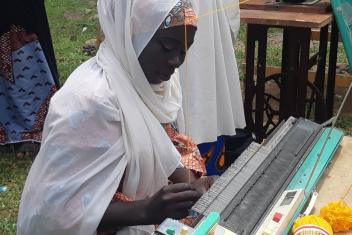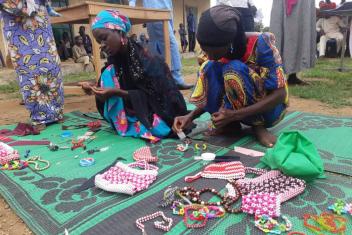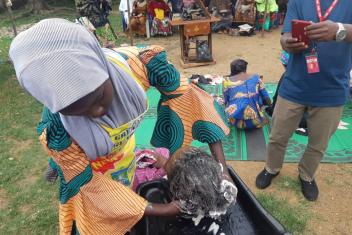1,156 Borno youth receive livelihood training from EU MAIDA
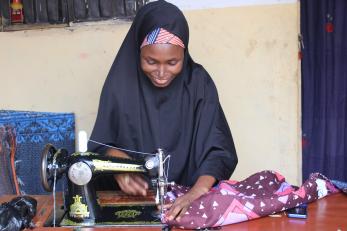
As part of our intervention to create viable employment and business opportunities for young people, Mercy Corps through the Borno Maida Early Recovery Program (MAIDA) is training young people in Borno state in various vocational skills. This is done as one of the core components of the program to improve rural livelihoods, increase access to protection services, and build social cohesion for the communities we work with. The participants are supported to pick a vocation of their choice with viable prospects within their communities from tailoring to automobile repairs, hairdressing, cap knitting, food catering, bead making, carpentry, phone repairs, aluminum works, construction and a host of other vocations. The training is being provided for youth across eight local government areas in Borno state where the program is being implemented, including Maiduguri Metropolitan Council (MMC), Gwoza, Ngala, Bama, Kwaya Kusar, Hawul and Biu. As of October 2020, 1,156 young people have been trained on the MAIDA program since the start of the program since 2017.
With these vocation skills, adolescents and young people are empowered to be economic actors in their communities by generating increased opportunities for employment for other people and offering them diversifying livelihood opportunities. We also connect them with opportunities to access financial services, loans and business development initiatives that will help them start up their businesses after the completion of their training. The training duration often spans 3-6 months depending on their chosen vocation of interest.
MAIDA also has within the program employment initiatives that temporarily employs youth to rehabilitate community assets through cash for work, and disbursing cash grants for livelihood start-ups and apprenticeships. The program partner, International Centre for Energy, Environment & Development (ICEED), also supports by providing cash grants to youth, and providing training on solar system design, installation, maintenance, sales and after-sales service; and training youth on fuel-efficient stove production.
18-year-old Aishatu Abdullahi is a youth from Sakwa community of Hawul LGA, Borno state, who was trained in tailoring. According to her, she chose tailoring so she could get the skills to be self-reliant as a female so as to support herself and her children when she gets married. She also hopes to use the skills she has acquired to train other girls in her community.
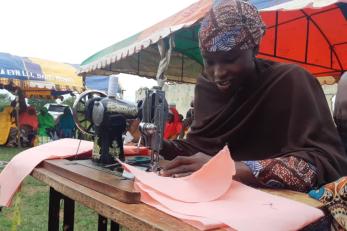
Inusa Abubakar is a male youth from Sakwa community of Hawul LGA Borno state who also participated in the vocational training among others. Inusa says he chose tailoring over other skills because of the importance of having a skill aside from the work he is doing and coupled with the fact that there are no jobs forthcoming for him. He hopes to use his tailoring skills to support his family and other people in his community.
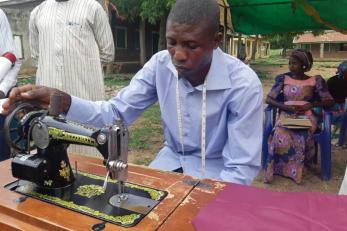
Participants showcase what they have learned during their livelihood training at their graduation ceremony in Sakwa community, Borno state.
Fatima Muhammad and Fanna Abubakar Yana pose with their certificate during their graduation ceremony in Mafa LGA, Borno state.
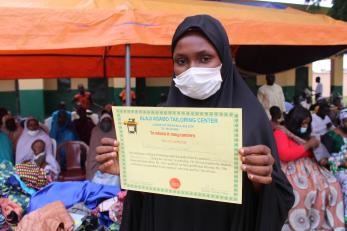
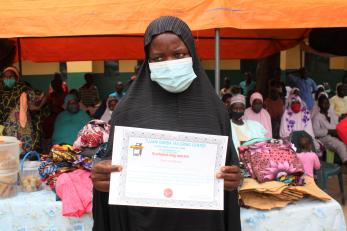
About the EU MAIDA Program
Mercy Corps Nigeria, with funding by the European Union, is implementing the MAIDA program to support the early recovery of about 200,000 returnees, internally displaced persons, and members of host communities affected by the violent insurgency in Borno State. Implemented in partnership with the International Centre for Energy, Environment and Development (ICEED), the program is implemented in accordance with the EU’s objective to build the resilience of conflict-affected people and communities in Borno in an environment-friendly way.
MAIDA also works with youth and adolescents to create opportunities for employment, giving them vocational training and helping them to diversify their income. The program also improves rural livelihoods through the provision of grants/input vouchers, establishing Village Saving Loans Associations (VSLAs), mobilizing and rehabilitating agriculture and livestock cooperatives, and linking them to financial services. MAIDA also works to increase access to protection services for vulnerable populations and building social cohesion for conflict-affected communities. The program supports vulnerable households by disbursing cash transfers, providing energy-efficient shelter, and promoting nutritional and hygiene knowledge. In partnership with ICEED, we provide fuel-efficient wood stoves that reduce time spent seeking firewood by women and girls.
